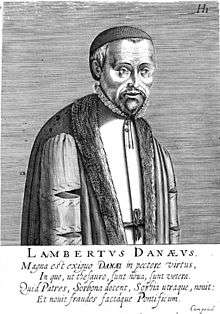Lambert Daneau

Lambert Daneau (c. 1535 – c. 1590) was a French jurist and Calvinist theologian.
Life
He was born at Beaugency-sur-Loire, and educated at Orléans. He studied Greek under Adrianus Turnebus, and then law in Orléans from 1553. He moved to Bourges in 1559; he was particularly influenced by François Hotman, and by Anne du Bourg, who was executed in that year for heresy.[1]
He went to Geneva first in 1560, and then became a pastor in Gien. After eight fruitful further years in Geneva from 1572, he made a reputation as preacher and theological writer. He left for a position in the University of Leiden. He taught also in Ghent, Orthez, Lescar, and Castres.[2]
Views
He wrote a book on witchcraft, Dialogus de veneficiis (1564). His views on the topic of hunting witches caused trouble for him in Leiden.[3] It was translated, in its 1574 edition, into English by Thomas Twyne as A Dialogue of Witches (1575).
His Physica christiana (1576) argued for a Scriptural basis for physics. It was translated by Twyne as The Wonderfull Workmanship of the World (1578).[4]
Notes
- ↑ Oliver Fatio, Lambert Daneau 1535-1590, p. 69 in rian P. Levack, Articles on Witchcraft, Magic, and Demonology (1992).
- ↑ Donald K. McKim, David F. Wright, Encyclopedia of the Reformed Faith (1992), p. 95.
- ↑ Bengt Ankarloo, Stuart Clark, William Monter, Witchcraft and Magic in Europe: The Period of the Witch Trials (2002), p. 81.
- ↑ Christopher B. Kaiser, Creational Theology and the History of Physical Science: The Creationist Tradition from Basil to Bohr (1997), note p. 165.
See also Olivier Fatio, "Lambert Daneau 1530-1595" in Jill Raitt, ed., Shapers of Religious Traditions in Germany, Switzerland, and Poland, 1560-1600 (New Haven: Yale University Press, 1981), pages 105-119.
External links
- Friedrich Wilhelm Bautz (1975). "Daneau (Danaeus), Lambert". In Bautz, Friedrich Wilhelm. Biographisch-Bibliographisches Kirchenlexikon (BBKL) (in German) 1. Hamm: Bautz. cols. 1206–1207. ISBN 3-88309-013-1.
- Works by or about Lambert Daneau at Internet Archive
- Works by Lambert Daneau at Post-Reformation Digital Library
|